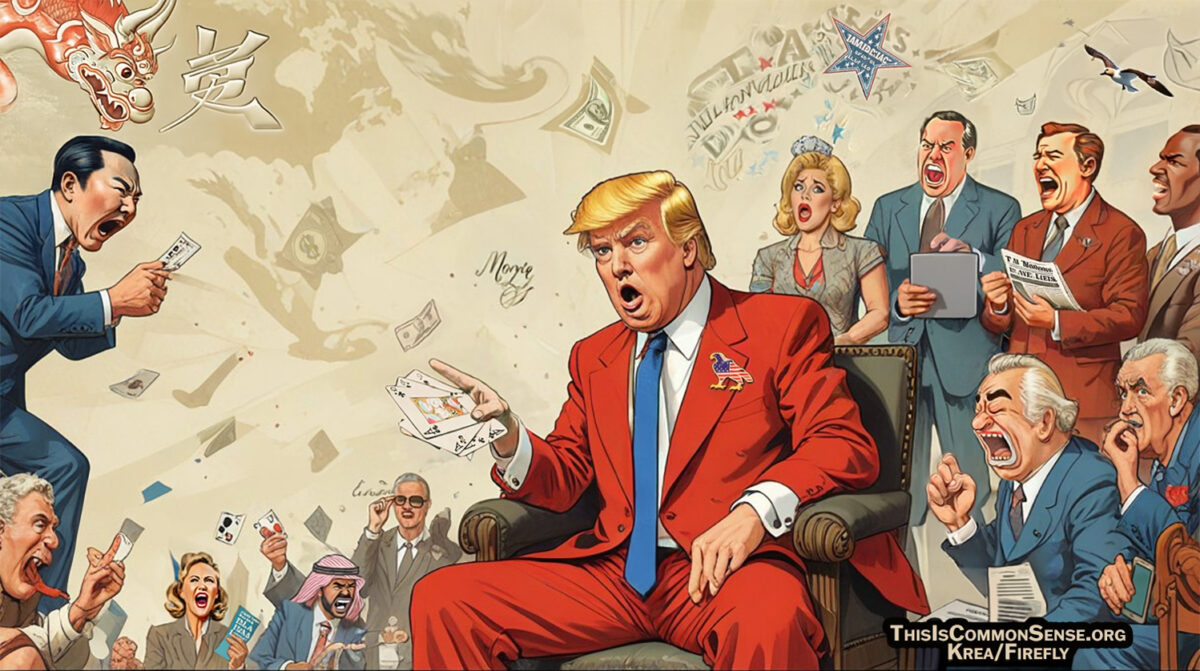The fight over the president’s tariffs is taking place in Congress.
Or is it?
“House Republicans blocked on April 9 an effort by Democrats to force a vote on halting the reciprocal tariffs imposed by President Donald Trump,” explains The Epoch Times, “which are currently paused for three months.”
Let’s make that clearer. These now-infamous/much-debated “reciprocal tariffs” went “into effect” immediately after midnight yesterday. As Republicans “sneakily” worked to change the rules to disallow any congressional move to dissolve the president’s declared emergency — which, by Congress’s own legislation, gives the executive a great deal of latitude to change tariff rates — and Democrats moved to do just that, get rid of the “state of emergency,” President Trump put most of his tariff hikes on hold for three months.
Except for those on China — now in effect, at a rate of 125 percent.
It sure looks like Trump’s main concern is trade relations with China, not Lesotho or Israel or anywhere else. And much can be said about China’s trade policies (try selling American consumer goods in China) or respect for intellectual property. But it is the matter of constitutionality that interests me most.
Whatever the alleged merits of high tariffs, unilateral free trade, or any of these issues, these policies should not be decided by the president; the Constitution gives Congress the responsibility “to lay Taxes, Duties, Imposts and Excises” and “regulate Commerce with foreign Nations.”
By handing the president “emergency” powers to change tariff policy in the first place, Congress has abdicated its role in setting tax policy. Republicans in the House seem gung-ho about Trump’s prerogatives. And Democrats haven’t sought to repeal the International Emergency Economic Powers Act, which gives the president legislative taxing authority.
Apparently, Congress wants the president to be king.
This is Common Sense. I’m Paul Jacob.
Illustration created with Krea and Firefly
—
See all recent commentary
(simplified and organized)

3 replies on “The Tariff King”
As I noted years ago in my ‘blog, the Constitution does not provide for veto-proof rescission of delegated Congressional responsibility, so the Constitution does not provide for delegation of Congressional responsibilities in the first place, which delegation is otherwise be an amendment de facto by Congress of the Constitution.
This point bears not simply upon tariffs, but upon the ability to start wars, and upon regulation. As to the last point, note then that the administrative state — so very dear to the political left — is utterly unconstitutional.
Nothing particularly good is likely to come from the present upheaval. None-the-less, a possibility remains that the Supreme Court will intervene actually to bring the Federal government back into conformance with the Constitution on the point of delegation. Trump would then lose this terrible power to tax imports, war with Iran will become far less likely, and the corporate left will spiral into a violent frenzy as the regulatory bureaucrats are told to pack-up and get out.
The Congress has abdicated so many duties and responsibilities, that this is WAY down the list. The Constitution does not allow Congress the delegated its authority on essentially anything, else there can be no holding them accountable by their constituents
Quit blaming “congress”! It is rebublicans ONLY. The trade imbalance is why this country is rich. China sells “everything” to the U.S. in turn China gets Treasury notes, etc. we get billions of cheap goods and China gets “paper” that sits in a drawer. China has about 784 billion dollars worth of U.S. paper. They buy some from U.S. but the rest remains in a drawer!. China has financed the high cost of living for Americans!